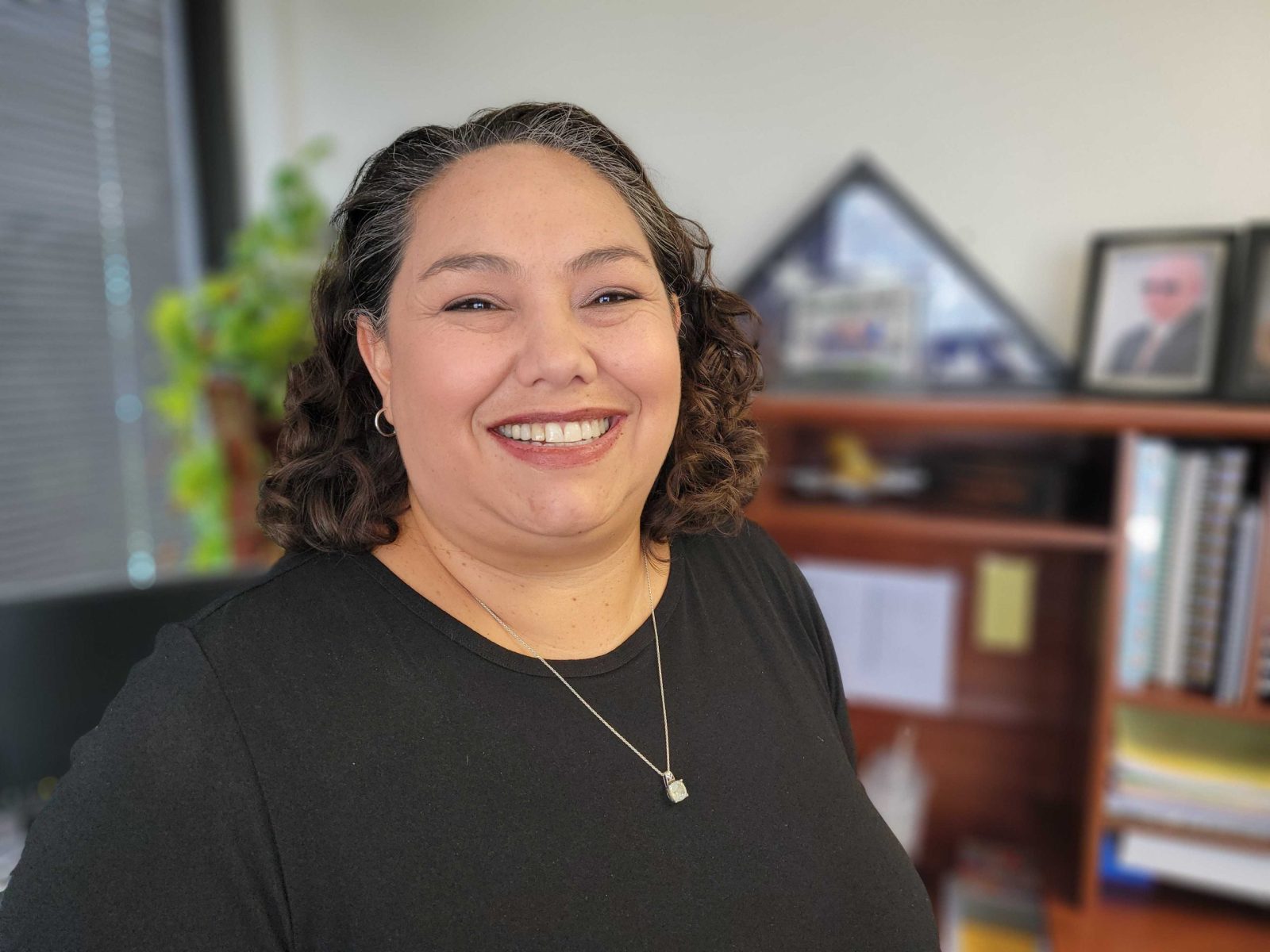Rebecca Weber and her husband, Isaac, became foster parents at a fairly young age and before they had a child of their own. They were both just 23 when they took in their first foster kids, a pair of brothers aged 13 and 16.
Weber, who now works as program director for CASA (Court Appointed Special Advocates) of Southwest Missouri, had just graduated with a degree in social work and was employed as a foster care case manager at the time.
“When I was a social worker for foster care, I saw all these kids with just an incredible amount of potential, just great personalities and huge goals,” she said. “They had a vision for their lives, but I couldn’t even find a place for them to lay their head that was consistent. And for me, that was just heartbreaking.”
The Webers eventually adopted those two boys. A few years later, they adopted two other teenage foster kids. They have one biological daughter, bringing the headcount in the Weber family to seven.
Since they started fostering in 2014, the Webers have fostered at least 26 kids of varying ages but mostly teenagers.
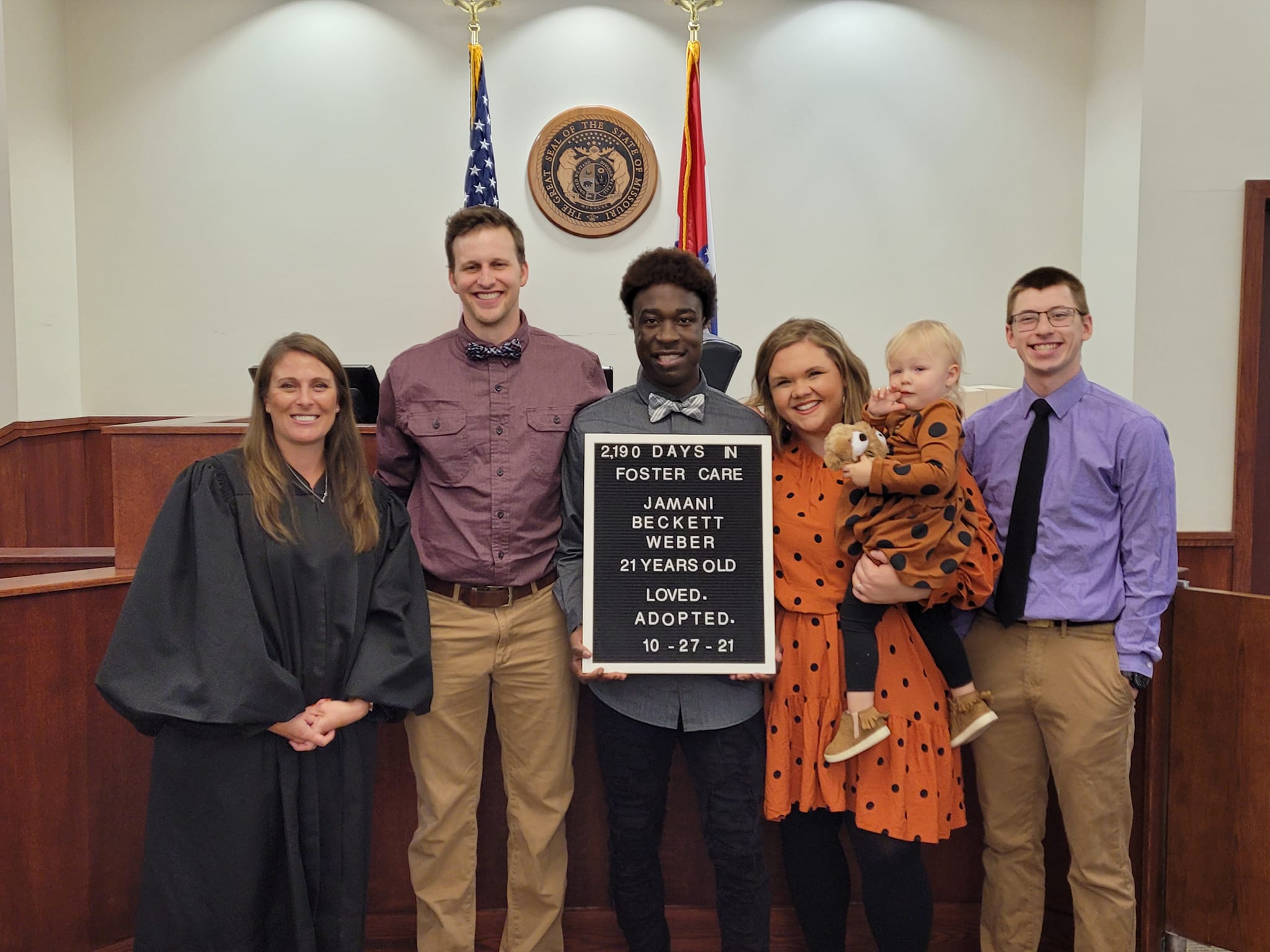
“For us, teens make total sense. We love being active. We love going on adventures and traveling and doing stuff,” Weber said. “Sometimes toddlers didn’t fit in with that idea. And we’re like, why not just bring a bunch of awesome kids with us on all the stuff we do?
“And teens in general, I am fascinated by them. They’re fun and you can hold conversations with them,” she continued. “They’re kind of at the most critical point in their life. I think about what a hot mess adolescence is, honestly. And so have that with the trauma that they bring with them — if they don’t have someone pouring into them at that point, we know what their future is going to look like. And it doesn’t look great.”
Teens need reliable, significant adults
Weber is not just speaking anecdotally.
According to information provided by CASA of Southwest Missouri, within four years of aging out of foster care with no responsible, reliable and significant adult in their lives:
- 70 percent will be on government assistance
- 50 percent will be unemployed
- 50 percent will experience homelessness
- 25 percent will not have completed high school
- Less than 12 percent will ever earn their college degree
- All this results in about a $1 million economic burden to society for each young person who ages out of foster care without that adult support
“The reality for our kids in the foster care system that do not have at least one significant support person, whether it be a foster parent, a CASA or just someone who’s taken a vested interest in them,” Weber said, “they are more likely to end up homeless. They are more likely to end up pregnant or having a child before they’re emotionally or financially prepared to. They are more likely to struggle with significant mental health issues the majority of their lives based on the trauma they’ve experienced without anyone to remediate that for them.”
Unfortunately, the need for local foster families willing to take in older kids— and really any age child — is critical, according to Lisa Crawford, circuit manager for Greene County Children’s Division.
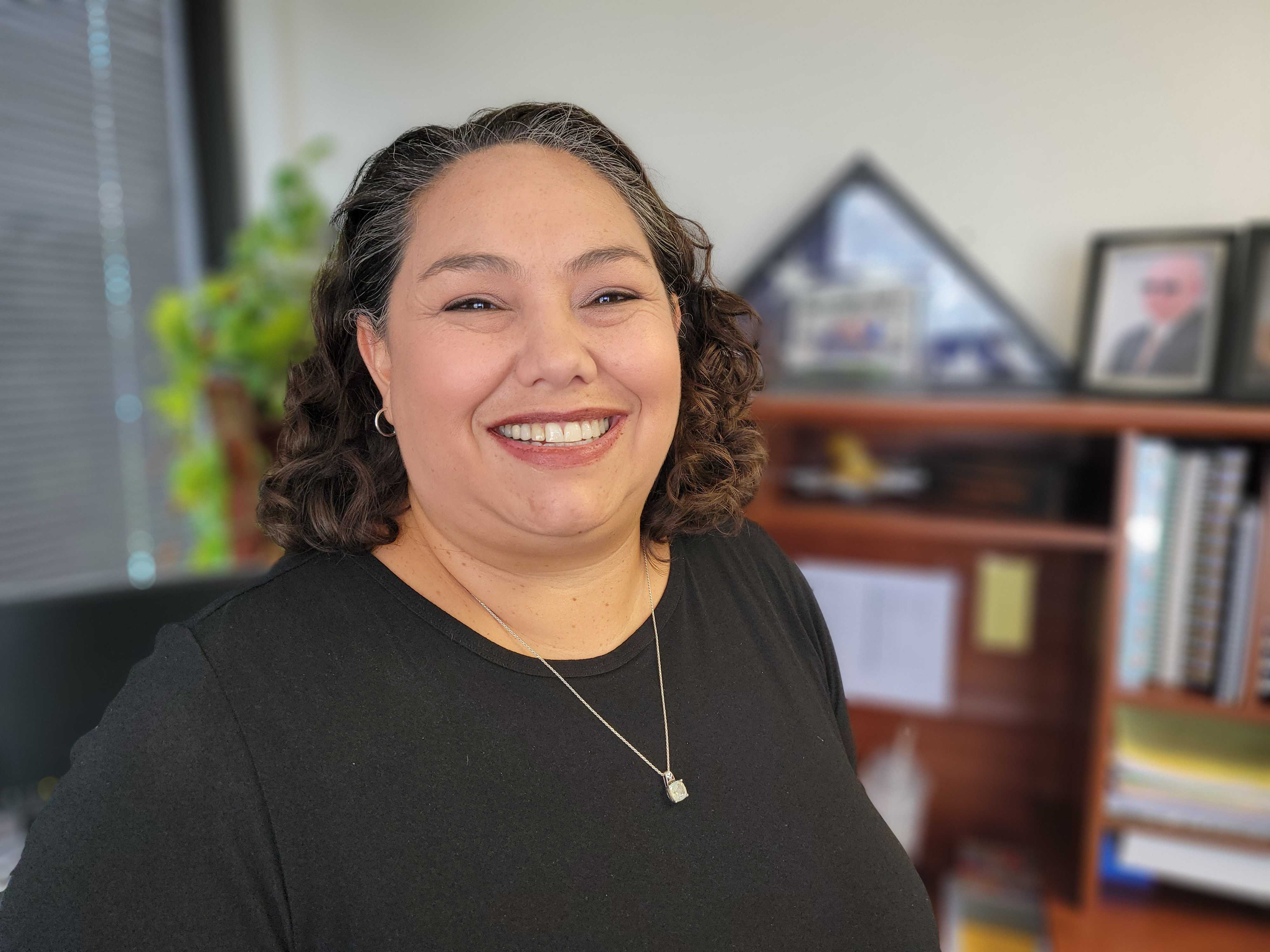
“Our older youth are harder to place. We know that,” she said. “But in general, there’s just not enough homes for kids.”
If a youth over the age of 8 were removed from their home in Greene County right now and didn’t have a relative to take them in, the Children’s Division caseworker would be scrambling to find a foster home.
On Aug. 18, 2022, these were the only foster home openings in Greene County:
- One home for a girl age 6-8
- One home for a girl age 0-3
- One home for a girl or boy age 0-2
- One home for a girl or boy age 0-1
- One home for a girl age 5-8
Any sibling groups would have to be separated.
That’s not to say the caseworker couldn’t eventually find a placement for an older child.
“We always seem to be able to make it work. It feels like we work some miracles,” Crawford said. “Sometimes we maybe have to find a temporary placement until something else can come up.”
Older children and teens are better able to tell caseworkers about adults — relatives or family friends — who might be willing to take them in, Crawford explained.
Story continues below
Head of Greene County Children's Division talks about the need for more foster homes
Greene County Children's Division Circuit Manager Lisa Crawford spoke to the Daily Citizen about the impact foster care has on children and teens.
Of those five homes that have an opening for a foster child, Crawford said it’s possible at least one would be willing to bend a bit on what age they will take if, for example, a 10-year-old child came into care and a caseworker called.
In 2021, 84 new teenagers entered foster care in Greene County (this number does not take into account teens who were already in foster care).
“When I hear foster parents talk about taking teens, for the most part they talk very positively about how they were scared when they first started,” Crawford said. “Then once they do it, once they take that chance and that risk, most of them find a lot of joy in it.
“I think every child is going to come with challenges,” she added. “But our older youth are some really amazing kids who've had this whole lifetime of experiences maybe that some other kids might not have — but they are just kids and they need a caring adult to take care of them.”
Keeping kids close to home is important
Unfortunately, a lot of kids and teens are being placed in foster homes outside of Greene County. As of last month, 316 of the 728 Greene County children and teens in foster care have been placed outside of this county.
Keeping the youth with their biological family is always the best scenario, said Bill Prince, Greene County’s Family Court Administrator and Chief Juvenile Officer.
But when that’s not a safe situation, it’s best they be placed in a foster home in their community.
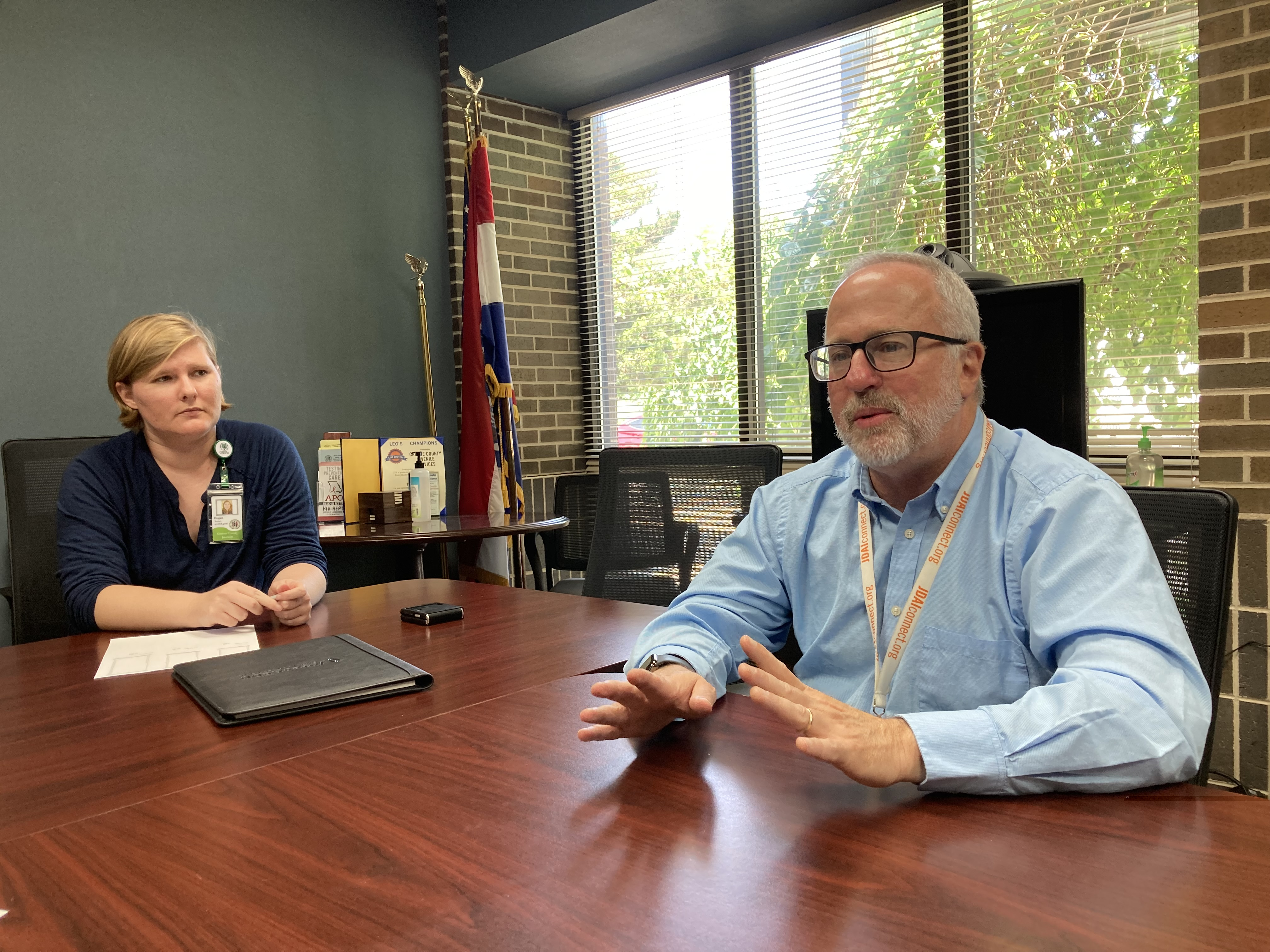
“It’s just easier when they’ve got their support and their family is here for visitation,” Prince said. “If you take a Greene County kid and you have to place them in Caruthersville or Moberly or someplace like that, just the geography of it makes reunification much more difficult.”
Weber agreed.
“If we’re dealing with kids in foster care who are wanting or needing to be reunified with their families,” she said, “and we’ve shipped them off two and a half hours away, the reality of them having quality visits with their family is almost non-existent.
“They are typically removed from all natural supports that they have in this area,” Weber said. “If they grew up in Springfield their whole life and now they’re placed in Kansas City, that means Grandma’s not able to visit. That means best friend is not able to have any contact. It’s just a whole different world for them, and we know that when we take supports away from kids, it’s not ever something that’s positive.”
The media is almost never granted permission to talk to youth in foster care. That takes approval from nearly everyone involved in the case, including the judge. But the Daily Citizen recently spent time talking to foster parents who like Weber have opened their homes to taking in foster teenagers into their homes about what it’s like and what older foster youth really need.
Springfield couple says fostering teens fits lifestyle
Aaron Schekorra said he moved out of his father’s house when he was just 16 and bounced from home to home for a while before winding up with a friend’s family.
Though Schekorra was never in foster care, that friend’s family became his family and inspired Schekorra to become a foster parent.
“They helped me graduate high school and get off to college and support me,” he said. “So really it came from a lot of wanting to do for others what they did for me. And that was one of the reasons we also ended up kind of settling on teenagers our age (to foster).”
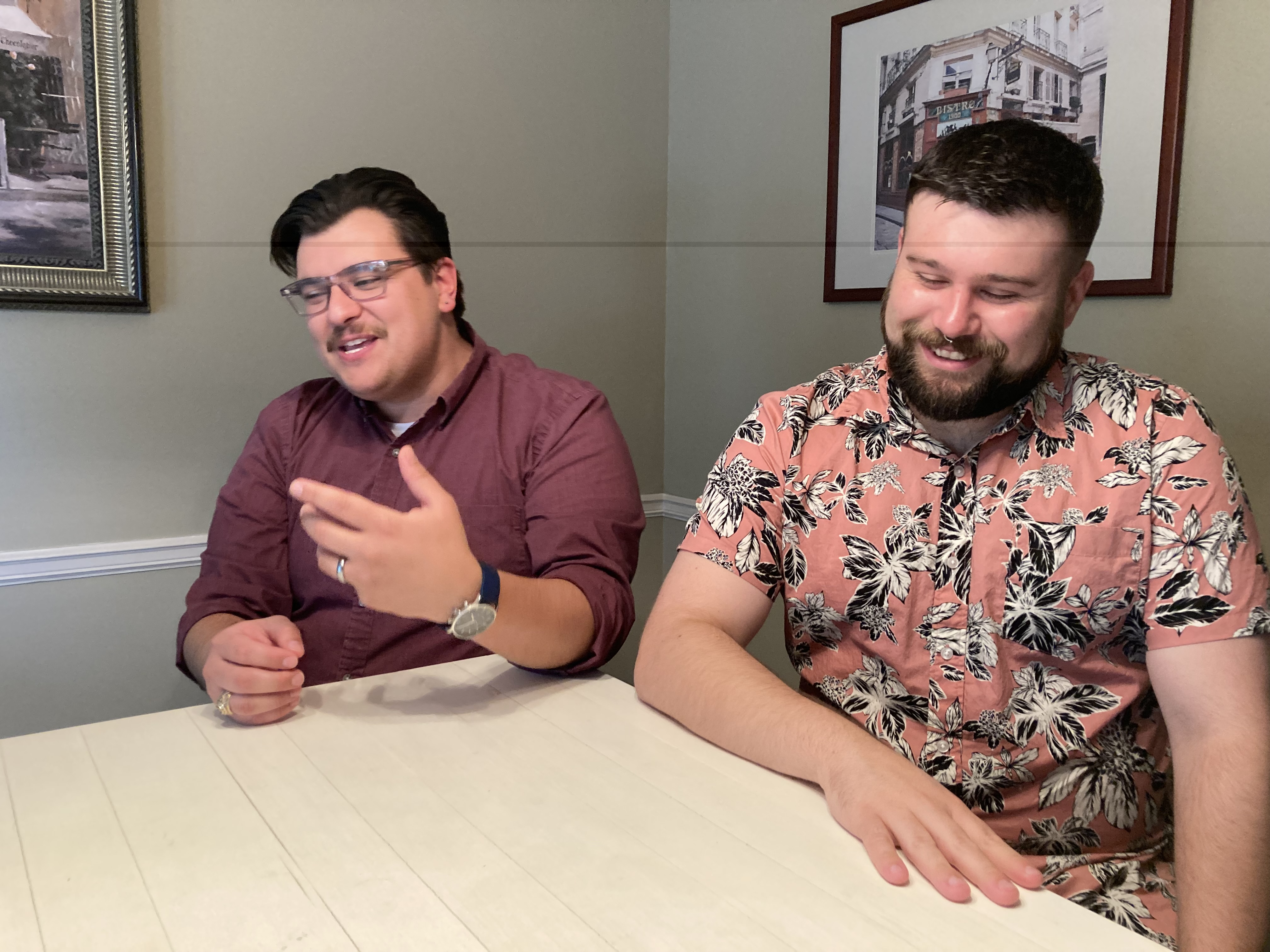
Aaron Schekorra and his husband Daniel became foster parents a little more than a year ago to a then-17-year-old. The Schekorras were both in their late twenties.
At the time, they worried the teen might not respect their rules since there wasn’t a huge age difference. And as a same-sex couple, they also worried about running into preconceived beliefs and prejudices from the biological families or within the child welfare system.
None of those things really happened.
And the day after the teen came to live at the Schekorra home in south Springfield, they all got up and went to work — the foster teen included. They didn’t have to worry about finding child care or a babysitter or any of the usual things foster parents have to worry about when taking in a younger foster kid or baby.
“(Fostering a teen) really fits in with our lives,” Aaron said. “We both work and we are both very busy people. He can either come to stuff that we’re doing because he’s not a baby or he can be on his own and do his own thing.”
Daniel nodded in agreement.
“It really kind of aligned with where we were in our lives at that point,” Daniel said. “For me, it’s being there for somebody who would be aging out of foster care otherwise and just being able to kind of be a continued support system as well.”
Fostering older youth can be rewarding
Other than the occasional battle of leaving dishes in the sink, it’s been pretty smooth sailing in the Schekorra household since the teen moved in.
“We have normal teenage things,” Aaron said. “We were a little concerned that this is almost a fully grown person that we’re now responsible for parenting, almost an adult at this point legally. We were trying to figure out what that was going to look like and what that relationship was going to look like.”
In some ways, the couple's young ages were a benefit to building a relationship with the teen. Aaron said they are able to relate to some of the things the young man is going through right now because it wasn’t so long ago, he and Daniel were dealing with the same things.
“Our situation has been a lot easier than we thought it was going to be,” Aaron said. “That’s not always going to be the case. It is still hard at times and still full of emotions, both positive and negative. You get to do really cool things by being foster parents like giving kids a lot of first experiences.
“You have opportunities to try new things with them, which has been really cool for us,” he said. “But you are also parenting a child who was raised by somebody else for a certain number of years or has been in foster care for a really long time.”
Teen chose to stay in foster care
Asked if there’s ever been moments when they knew they were doing the right thing, Daniel and Aaron looked at each other and smiled. They were thinking of the same instance.
“When he turned 18 and didn’t move out,” Aaron said. “That was a big one. Because I think beforehand that was his plan, and he chose to stay. He verbalized that his choice was to stay.
“He thought there’s a benefit to continuing to be in foster care,” he said, ”which a lot of kids at that point don’t want to be any longer. There’s a lot of motivation when they turn 18 to be an adult and be free of the system. And he’s choosing every day to stay in the system.”
The young man can remain in the foster care system — if he chooses — until he is 21.
The Schekorras say they’ll be part of the young man's life as long as the teen wants.
Aging out of care with no adult support
Ashley Quinn has been fostering a teenager for a little more than a year now.
Quinn, who works as the justice coordinator for National Avenue Christian Church, is a longtime advocate for social justice issues including LGBTQ homelessness.
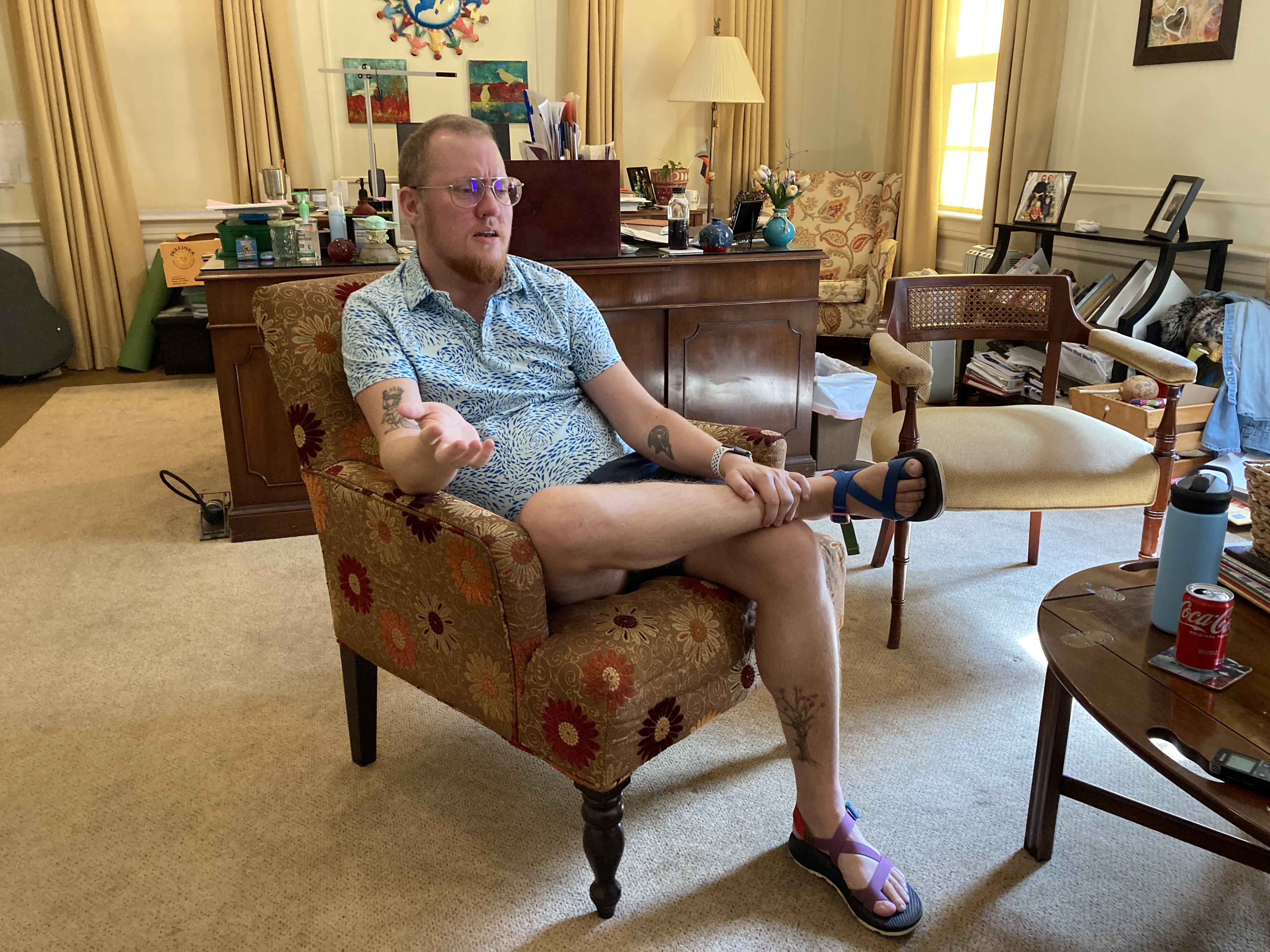
Because of that, he knows about the increased risks and challenges facing youth who age out of the foster care system with no reliable adult support.
“There’s a lot of people who are chronically adult homeless folks who at some point in time (aged out) of foster care,” Quinn said. “There’s lots of folks that pass judgment on homeless folks and think they’ve made poor choices or something like that to get them into the lot they're in.
“And a lot of those choices were made for them when they were kids, that they didn’t have any say in,” Quinn added. “And they grew up without support networks — someone to call when you’re short on rent and say, ‘Can you front me $500 and I’ll pay you back $100 for the next (five) months or whatever. If you don’t have someone that you can call and do that, then they evict you from the spot you’re in because your hours got cut at work or whatever.”
More LGBTQ education needed
Quinn, who is a transgender man, felt he could help fill a need for foster parents who are welcoming to LGBTQ kids.
“I knew that was kind of a niche I can fill and have a better idea of some of their life experiences and what they might be going through,” Quinn said, “and what kinds of resources to help them connect with and help make sure that they felt super comfortable in their home.”
Quinn learned from his current foster kid that there’s sort of an unofficial rule among LGBTQ foster kids: Don’t share that side of you with your foster family.
Quinn added that he doesn’t know how common it is for foster kids to have to leave their foster homes because they are LGBTQ, but it’s certainly something the kids worry about.
Finding foster homes that are welcoming to LGBTQ kids can be extremely challenging, Quinn said.
“I’ve gotten at least four calls in my less than a year of fostering asking me to take transgender kids,” Quinn said, “and I had to say no due to capacity.”
LGBTQ-welcome foster homes needed
Even though the Schekorras are not currently on the list of foster parents willing to take in more kids, they sometimes get calls from caseworkers who are searching for an open and welcoming home for an LGBTQ kid.
“Because we are a same-sex couple and having expressed willingness to foster a transgender boy, we do get calls fairly regularly,” Aaron said. “There have been some where we’ve been told by the person on the phone that the reason they are in foster care or the reason that they’re being disrupted in their current foster placement is because they’re transgender or because they’re gay.”
For that reason, the Schekorras said they’d like to see more education for all foster parents about LGBTQ issues.
“A lot of people that we’ve spoken to over the year, the reason they say no is not because they are transphobic or not because they don’t want queer kids in their home,” Aaron Schekorra said. “It’s because they don’t feel qualified to parent those kids. They’re going through a very unique experience, one that a cisgender heterosexual couple may not understand.
“So they say no because it’s just something new and something different and something they’re not sure exactly how to parent,” he continued, “and they’re worried about doing it wrong.”
To that, Schekorra pointed out that you don’t have to be LGBTQ to properly parent a LGBTQ kid.
“Parenting is parenting,” he said. “The rest you can learn.”
Trauma-informed education is key
Weber, the foster parent who works at CASA, agrees there needs to be more LGBTQ education for foster parents. All CASA volunteers are continually educated and trained on how to support and advocate for a youth who is LGBTQ.
“That’s something that we try to focus on here at CASA,” she said, “especially with our advocates that we work with, really making sure that they have that information to pass on to foster parents.”
It’s also important for foster parents to understand trauma and how it can impact the youth’s brain and their behaviors, Weber said.
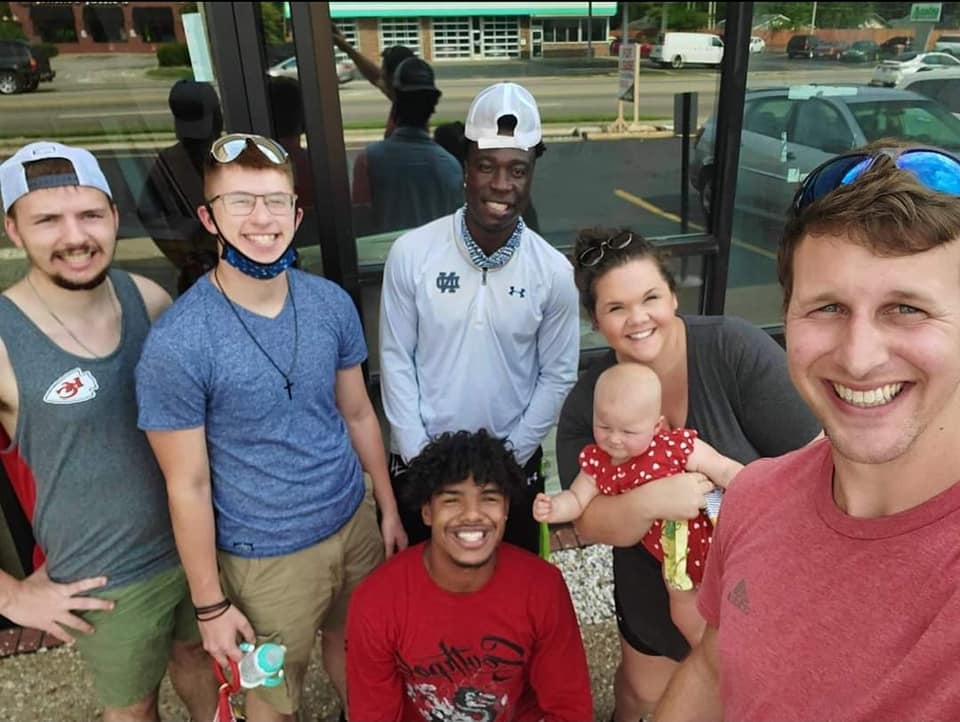
“We know the brain science behind kids who have been traumatized. We know that their behaviors are going to be different,” Weber said. “Their needs are going to be different at home and at school.”
CASA offers a training called TBRI, which stands for trust-based relational intervention and is focused on understanding trauma, Weber said. This type of education for foster parents can help foster teens avoid having to change placements because of their behaviors — something that is unfortunately common for older kids and teens.
“Our kids in foster care, they’re really working from a place of a brain that’s wired for survival,” Weber said, explaining the premise behind TBRI. “They’ve had to keep themselves alive for so long based on the abuse that they’ve endured. And so their normal interactions … are going to be very colored by their experiences.
“When they have a blowup or a bad behavioral reaction, it’s not necessarily because they are a bad kid or because they’re defiant (or) entitled,” Weber said. “It’s literally because their biology is telling them: keep yourself alive.”
Rachel Hogan, director of quality services with the Greene County Juvenile Office, pointed out that even being removed from their home and family is a traumatizing experience.
“It’s a really complex population,” Hogan said. “Finding the right people who want to care for them and keep them in a family setting is really critical.”
Making the decision to foster older youth
Quinn’s been fostering a now-16-year-old boy for more than a year now.
Asked why he opted to foster older youth, Quinn shrugged.
“I said I was open to anything,” Quinn said.
He then recalled a recent conversation he had with his foster kid: “We have this empty room at the moment, and he was like, ‘So what age could we get?’ And I was like, ‘Theoretically, we could end up with an infant or anything in between.'
“But now that I have a teenager in the household, I would probably be more apt to say yes to another teenager of similar age,” he continued, “so we’re kind of in that same ballpark of expectations of what we can do, what we can’t do.”
That said, Quinn said he’s not looking to add another foster kid to his household right now.
“I think it’s going pretty well,” Quinn said of his relationship with his foster teen. “He’s a really great kid.”
First-time parent suddenly raising a teen
Even though Quinn is the one who’s supposed to be teaching the teen life lessons, sometimes it’s the other way around.
For example, Quinn and his teen recently had a conversation about how the teen should dress for an upcoming job interview.
Quinn subtly suggested the teen dress a tad more conservatively than he usually does for school.
“He was just kind of like, ‘Why would I want to wear that?’ And I was like, yeah — why would you and why do we ask that of people,” Quinn said. “He’s an artist, and I’m not.
“A lot of the way that I operate in the world is trying to fit into the way things are,” Quinn continued. “And he’s not, and I don’t want to take that away from him. I don’t want to try to stomp that out.”
It’s also been a learning experience because Quinn has never done the parenting thing before.
“My kid the other day was like, ‘I wish I wasn’t your first.’ I was like, ‘I think that’s probably something all first children think,’” Quinn said, laughing. “I’m a first as well, and there’s a ton of things my parents regrouped and did differently with my little brother. So I can relate to that. And yes, I’m sorry that you have to be my first, but I’m also glad he’s my first.”
There have been times when the teen and Quinn got into a disagreement and the teen threatened to call his caseworker and ask to be moved to another foster home.
“I’m like, ‘Yeah, if you don’t think this is a good house for you, and you think you’d be better off in a different placement, I want what’s best for you,’” Quinn said.
But in the end, the teen always cools off and decides to stay in Quinn’s home.
“It is 100 percent worth it to do it,” Quinn said of becoming a foster parent. “It was a long process to get involved in the first place. It felt fairly intrusive, but I appreciate that they get as in-depth as they do, because we don’t want people who are in it for the wrong reasons.
Quinn encourages anyone interested in helping to consider becoming a foster home respite care provider. These are people who provide care for foster kids for a brief time to give the foster parents some time to themselves or a chance to go on vacation.
“It’s kinda like being the grandparents for the weekend,” Quinn said, “give parents a little break.”
Want to help?
Learn more about the many ways you can help, including ways to volunteer, how to become a respite foster care provider, how to become a foster parent and information about becoming an adoptive parent on FosterAdopt Connect's website.
You can also find information about fostering and adopting, as well as information about how to keep children safe on the Missouri Department of Social Services/Children's Division website.
Report child abuse and neglect by calling 800-392-3738.


